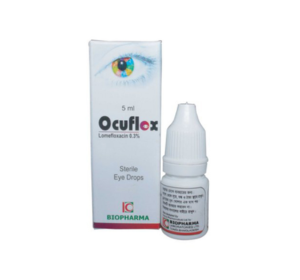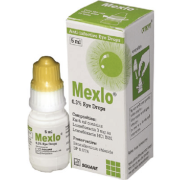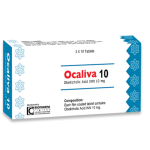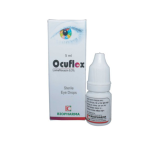Ocuflox Ophthalmic Solution
Lomefloxacin
0.3%
Biopharma Limited

5 ml drop: ৳ 70.00
Indications
Ocuflox ophthalmic preparation is indicated in the bacterial infections, including conjunctivitis, blepharitis, blepharoconjunctivitis which are due to Ocuflox susceptible germs and Staphylococcus aureus- induced corneal ulcers.
Pharmacology
Lomefloxacin, a difluorinated quinolone derivative, is a bacterial gyrase inhibitor, effective against gram positive and gram negative bacteria. The acute toxicity of Lomefloxacin following systemic and topical ophthalmic application is low. Lomefloxacin interferes with bacterial DNA related processes like initiation, elongation, and termination phases of replication, transcription, DNA repairing, recombination, transposition, supercoiling and relaxation of DNA. The target molecule for quinolones is the A-subunit of bacterial enzyme gyrase (topoisomerase II). The forming of a stable complex between the quinolone and the whole gyrase teramer A2B2 leads to impaired enzyme functions, resulting in a rapid killing of sensitive bacteria.
Cross-resistance has only been reported with other quinolones, but not with any other group of antibiotics. No clinical studies are available about the efficacy in cases of infections with chlamydia.
Dosage
Adults and children (above 1 year of age): Instill 2-3 times daily 1 drop into the lower conjunctival sac. At the beginning of the treatment application should be more frequent, apply 5 drops within 20 minutes or 1 drop every hour during 6-10 hours. Duration of the treatment: 7 to 9 days.
Administration
May be taken with or without food.
Interaction
In order to avoid reduction of efficacy, no ophthalmic preparations containing heavy metals, such as zinc, should be used during 15 minutes preceding and following application of Ocuflox. Bacteriostatic ophthalmic antibiotics should not be used concomitantly with Ocuflox eye drops.
Contraindications
Hypersensitivity to the active ingredient, to excipients, or to quinolones. Long term treatment with antibiotics may enhance development of secondary fungal infections or may support growth of non susceptible bacteria.
Side Effects
Slight and transient burning immediately after instillation of the eye drops has been reported in 4.7% of users. Although phototoxicity has not been reported after ophthalmic use, photosensitization is possible. Since the following allergic reactions have been reported after systemic use of Ocuflox, they can not be excluded after topical ophthalmic use: allergic reactions, asthma, dyspnoea, urticaria, erythema, pruritus, and hypersensitization.
Pregnancy & Lactation
Animal studies revealed that after systemic use of 20 mg/kg, Lomefloxacin passes the placenta barrier and is excreted into the maternal milk. Clinical studies on the use of Lomefloxacin eye drops during human pregnancy or lactation are not available. Therefore, the drug should only be used when the benefit outweighs the potential risk for the foetus or the infant.
Precautions & Warnings
Some isolated cases of phototoxicity have been reported after systemic but not after topical ophthalmic use of Ocuflox. Nevertheless, during treatment with Ocuflox intensive exposure to sunlight or UV-radiation should be avoided
Overdose Effects
Practically there is no risk of adverse effects due to accidental oral ingestion, since a bottle of 5 ml eye drop solution contains only 15 mg Ocuflox. This corresponds to 3.75% of the recommended oral daily dose for adults of 400 mg Ocuflox.
Therapeutic Class
4-Quinolone preparations, Ophthalmic antibacterial drugs
Storage Conditions
Store at 15-25° C
* রেজিস্টার্ড চিকিৎসকের পরামর্শ মোতাবেক ঔষধ সেবন করুন‘




